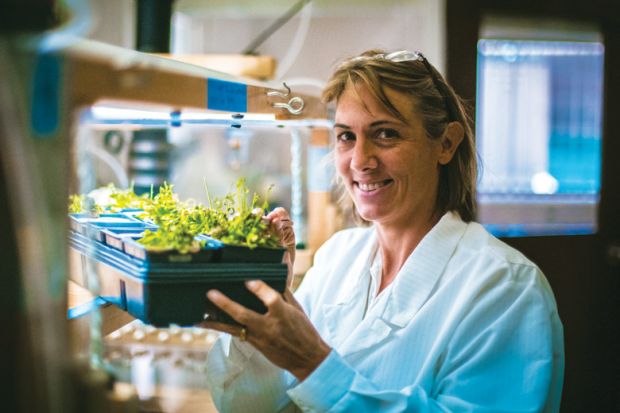This is an absolutely extraordinary book. I’ll admit that I was a bit disgruntled after the first third and put it down for a while. Two-thirds of the way in, though, I had goosebumps. By the end, I was babbling about it to complete strangers and determined to give a copy to just about everyone I know.
Hope Jahren’s Lab Girl is a combination of memoir and paean to her discipline of palaeobotany. She describes in lyrical detail growing up in the frozen wastes of Minnesota, going to college, doing her PhD at the University of California, Berkeley, establishing herself as a group leader first at the Georgia Institute of Technology, then Johns Hopkins University, and finally the University of Hawai‘i at Mānoa. Interspersed with this account are chapters describing the plant world, and just as a seedling struggles to become the tree it is destined to be, this book describes Jahren’s emergence as the person and scientist she is meant to be.
So why my disgruntlement? The chapters describing her childhood and young adulthood portray a solitary person, determined to make sure that she would not remain in the small town in which she grew up, where everybody knew everybody else and where she was otherwise destined to become an assembly line worker in the local abattoir. Unlike her mother, who was denied the chance to finish college, Jahren escaped to the University of Minnesota. Her account of the pharmacy assistant job she took to support her studies is slightly terrifying (she was “a sleep-starved teenager apprenticed to a chain-smoking barmaid” dispensing potentially lethal cocktails of drugs), and she begins to come across as both a perfectionist and a workaholic. By the time she emerges as an assistant professor, she is working herself to the bone, constantly stressed, insomniac, always on the edge of failure – the tortured genius in an ivory tower who has to work harder, harder, ever harder.
This is why I wanted to shake Jahren, and why I put the book down. Such a narrative does neither the individual nor the academy any favours. The idea that you have to push yourself to the very edge of reason in order to succeed is dangerous, but nonetheless frighteningly prevalent – that you will never “make it” as an academic unless you go through this baptism of fire. Worse, if you manage to somehow avoid this induction, you’re not a “true” academic. It’s an idea I try to undermine whenever I hear it, and not just because this expectation damages individuals. It is also likely to turn off people, often women, who fear that they lack the necessary machismo and might end up asking themselves why on earth one would put oneself through so much pain. Another story along these lines, no matter how honest, is not one that needs to be told. But, as it turns out, that is not what Lab Girl is about at all.
What it is about is the fact that science, as an art form and a discipline, is forgiving and accepting of all of our personal quirks. The plants, the proteins, the quarks, the rocks, the oceans and the exoplanets that we study simply don’t care. There is space for all of us, with our personal oddities, if what is driving us is an understanding of how the world works and along the way we have some creative ideas. Science is oblivious as to whether we are slightly peculiar, make inappropriate comments, wear mismatched clothing, eschew make-up, swear too much, work the night shift, or live out of a van in a university car park. Our colleagues might, but science itself doesn’t care as we bring to it our craft. That is what this book is about, and it is both blazingly honest and genuinely beautiful.
This is also a story about family, about people and about relationships. This aspect is often absent from books about science and about scientists, or comes across as peripheral. Woven throughout Lab Girl is the story of Bill, who is Jahren’s colleague, friend and surrogate family member. Their friendship evolves and deepens throughout the book, describing how between them they always, somehow, manage to keep the show on the road. He is her lab manager, her muse, and the person who grounds her with the occasional much-needed “fuck it”. The strength and duration of their platonic relationship apparently puzzles many, who struggle to put it in the right box. But who needs a box?
Jahren eventually meets and marries Clint, and the description of how they manage their joint academic careers and a new family is straightforward and refreshing. However, Jahren is bipolar, and her honesty on this subject is brutal. It is something she adapts to over the years, but pregnancy and the consequent withdrawal of all medication gives rise to an episode that hospitalises her. It is painful to read, but highlights the human nature of the people at the core of what can seem to the outside world to be the driest of academic activities. Her drive, obsessiveness, perfectionism, insomnia and fretting suddenly appear in a different light. This is not how it has to be done – it is just how Jahren does it.
There are farcical elements as well: a cross-country trip to a conference that ends in skidding a van off the road in a snowstorm, a raiding party on a colleague’s work site, the Blu-Tack and sealing wax approach to setting up a lab that many of us will recognise, a minor lab explosion, an eight-hour side trip to Monkey Jungle, a Florida wildlife park, on the exhortation of a roadside billboard, and storing Bill’s shorn hair in the hollowed-out interior of a sweet gum tree. As someone in a discipline that rarely goes into the field, I found the insights into the realities of doing fieldwork particularly illuminating, and also rather daunting.
If you are familiar with Jahren’s blog, where she often writes about the challenges women face in the male-dominated academy, you will recognise Lab Girl’s astringent tone, but the subject is different. Although she alludes to the “otherness” associated with being a woman in science, this topic is touched upon only lightly.
What I most liked about the book are Jahren’s examples of how inspiration strikes. Standing on a moist Irish hill coming to terms with the death of Bill’s father, immersed in grief and drizzle, she suddenly wonders why, at the top of a hill, the moss-covered ground is sodden. Why hasn’t the water run downhill? How is the moss holding on to it? How is the moss shaping the environment rather than passively making use of it? This leads to a cathartic frenzy of sample collecting. Unfortunately the fruits of this painstaking labour are later confiscated at the airport by zealous security staff and callously thrown in the bin with the discarded drink bottles.
Lab Girl speaks to me, another “tiny, living part of the scientific collective”, as I strive to weave my scientific theories out of whole cloth. Jahren is not just a scientist, though, but a poet who has given us insight into her mind and her passions, and I feel privileged to have been granted a glimpse. Who knew soil strata could be so interesting? But I wouldn’t take a road trip with her. Well, not unless I get to drive.
Cait MacPhee is professor of biological physics, University of Edinburgh.
Lab Girl: A Story of Trees, Science and Love
By Hope Jahren
Fleet Books, 304pp, £16.99
ISBN 9780349006192
Published 21 April 2016
The author
 Hope Jahren, professor of geobiology at the University of Hawa‘i Mānoa, where she heads the Jahren Laboratory, was born and raised in Minnesota.
Hope Jahren, professor of geobiology at the University of Hawa‘i Mānoa, where she heads the Jahren Laboratory, was born and raised in Minnesota.
“The Minnesota of my childhood sits squarely within that small portion of the US where there is snow on the ground nine months out of the year. The long cold (frozen) winter contrasted sharply with the short growing season, where abundant plants – including farm fields; it was a rural area – flourished rapidly starting each May.”
Of her childhood, Jahren recalls: “My mother loved books, and my father loved science – he was a community college teacher. They both believed in learning as a lifelong process.”
Asked who encouraged her to believe that it would be possible for someone from a working-class background to progress to higher education, she says, “In those years, university education at a Minnesota state institution was essentially free for any high school graduate with good grades – in fact my first year of university was completely paid for. The fees that followed were manageable if I worked 10-20 hours a week while studying, and so I performed a variety of jobs at the university (including a stint in a hospital pharmacy).”
As a Fulbright scholar, Jahren spent a year at the University of Copenhagen working in its botanical garden. “Being surrounded by plants in such a beautiful historical setting, the setting of hundreds of years of study, was very enriching. I indulged in countless walks through the greenhouses as part of my daily work.”
In her blog #hopejahrensurecanwrite, and in Lab Girl, she is outspoken about gender discrimination and sexual harassment in the academy. Does she believe her male peers are becoming more aware of these problems and more supportive of women, or are they still defensive?
“Speaking out has brought many things. Many women, both inside and outside of science, have come to me with their stories – many of them horrific. I wish I could achieve justice for them. I grieve daily the fact that I cannot. Many of my male colleagues have drawn back from me, which is also hurtful. I also get a share of hate mail, much of it sexual in nature. However, the people with whom I work daily share my concerns, and staunchly support me. I will continue to speak out for as long as I believe my voice is necessary.”
In a recent interview, Jahren said: “Men’s science writing…very often sounds like, ‘This is what I know, and I’m going to tell it to you, and you’re going to take it the way I tell it because I’m the person who knows how to sell it.’ I’ve been lectured to by men on science enough for two lifetimes.”
Does she think mansplaining is worse in science (or the academy) than elsewhere?
“Mansplaining is worse in science because science is populated by men who have legitimately important material that they need to explain,” she replies. “My objection is that these descriptions seem often delivered to the listener without careful attention to how the listener is taking in the information.”
While scientists have always known that they are funny, quirky, interesting, varied, adventurous individuals, does Jahren believe that social media has helped the rest of the world find out?
“Twitter is an excellent resource for people who want to know about the daily life of the scientist, and to get a glimpse of the authentic informal personalities of the scientists themselves. Scrolling the hashtag #scicomm is a great place to start.”
Karen Shook
POSTSCRIPT:
Print headline: Seeing the wood and all the trees
Register to continue
Why register?
- Registration is free and only takes a moment
- Once registered, you can read 3 articles a month
- Sign up for our newsletter
Subscribe
Or subscribe for unlimited access to:
- Unlimited access to news, views, insights & reviews
- Digital editions
- Digital access to THE’s university and college rankings analysis
Already registered or a current subscriber? Login




